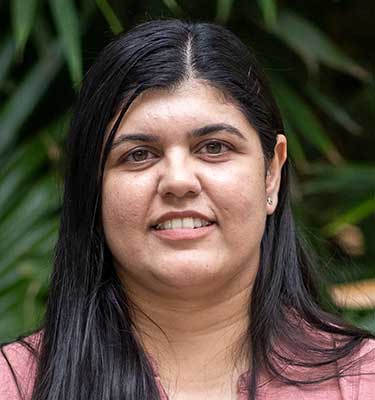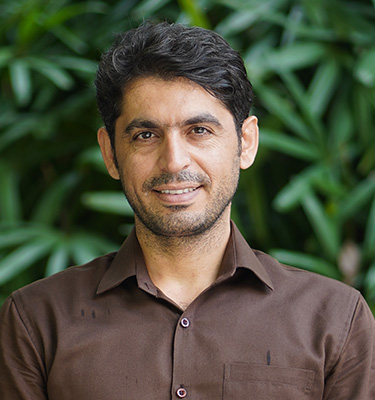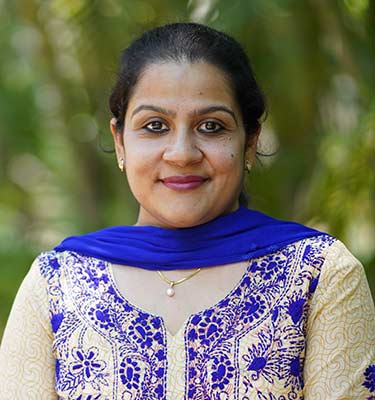







































FACULTY

Prof. Anuradha Batabyal
Prof. Anuradha Batabyal received her Doctorate Degree in Ecology from the Indian Institute of Science, Bangalore. She has completed Master’s Degree in Zoology from Pune University, and Bachelor’s Degree in Zoology from the University of Calcutta.
Prof. Anuradha has over four years of experience and was associated with Azim Premji University, Bengaluru as a researcher and guest faculty and was a postdoctoral researcher at the Hotchkiss Brain Institute, University of Calgary, Canada.
Prof. Anuradha’s research interest includes Behavioural ecology and cognition. Her Ph.D. research focused on understanding urbanisation's effects on the physiology, behaviour, and cognition of the Indian rock agama. For her postdoctoral work, she explored the effects of various environmental stressors such as temperature, pollutants, and predators on the learning and memory of pond snails. Her interest also lies in science outreach and integrating the concepts of learning and memory into pedagogical principles.
In her spare time, she enjoys hiking and painting.
Publications
- Rivi V, Sarti P, Fodor I, Pierger Z, Koene J, Pani LBatabyal A, Lukowiak K, Blom JMC, Tascedda F, Benatti C 2025. Effects of Alprazolam on Anxiety-Related Behavior in an Invertebrate Model: Advancing Translational Neuroscience. Translational Psychiatry. Accepted
- Rivi V, Batabyal A, Benatti C, Tascedda F, Blom JMC, Lukowiak K. 2025. Hot and cold exposure triggers distinct transcriptional and behavioral responses in laboratory-inbred pond snails. Water Biology and Security 1 (4): 100315 https://doi.org/10.1016/j.watbs.2024.100315 (Q1)
- Rivi V, Batabyal A, Benatti C, Tascedda F, Blom JMC, Lukowiak K. 2024. Quercetin the new stress buster: Investigating the transcriptional and behavioral effects of quercetin on multiple stressors using the model organism Lymnaea stagnalis. Comparative Biochemistry and Physiology Part C. Toxicology and Pharmacology. 287, 110053 https://doi.org/10.1016/j.cbpc.2024.110053 (Q1)
- Hollings J, Kagan D, Batabyal A, Lukowiak K. 2024. How to reduce fear in a snail: Take an aspirin call me in the morning. Comparative Biochemistry and Physiology Part C: Toxicology and Pharmacology 284. 109978 https://doi.org/10.1016/j.cbpc.2024.109978 (Q1)
- Batabyal A, Wiley B, Lukowiak K 2024. Sensory input from osphradium is involved in fluoride detection that alters feeding and memory phenotype in Lymnaea stagnalis. Behavioural Brain Research. 472: 115148 https://doi.org/10.1016/j.bbr.2024.115148 (Q2)
- Rivi V, Rigillo G, Batabyal A, Lukowiak K, Pani L, Tascedda F, Bennatti C, Blom JMC. 2024. Different stressors uniquely affect the expression of endocannabinoid-metabolizing enzymes in the central ring ganglia of Lymnaea stagnalis. Journal of Neurochemistry. 168(9):2848-2867 10.1111/jnc.1614738. (Q1)
- Rivi V*, Batabyal A*, Benatti C, Rigilo G, Lukowiak K, Blom JMC, Tascedda F 2024. A translational and multidisciplinary approach to study the Garcia effect, a higher form of learning with deep evolutionary roots. Journal of Experimental Biology. 227(8) jeb247325. https://doi.org/10.1242/jeb.247325 (Q1) (*contributed equally to this study)
- Batabyal A*, Rivi V*, Benatti C, Blom JMC, Tascedda F, Lukowiak K 2024. Snails go on a fast when aspirin comes along with heat stress: a possible effect of heat shock proteins and the serotonergic system on feeding response. Comparative Biochemistry and Physiology Part C: Toxicology and Pharmacology. 276 109805 https://doi.org/10.1016/j.cbpc.2023.109805 (Q1)(*contributed equally to this study)
- Kagan D, Hollings J, Batabyal A, Lukowiak K. 2023. Better Together: Isolation Impedes Memory Formation for Configural Learning in Lymnaea. Journal of Experimental Biology. 226(23) jeb.246478. https://doi.org/10.1242/jeb.246478 (Q1)
- Rivi V, Batabyal A, Lukowiak K. 2023. The multifaceted effects of bioactive compounds on neuroplasticity. Restorative Neurology and Neuroscience: 1-19. 10.3233/RNN-230150
- Batabyal A 2023. Predator-prey systems as models for integrative research in biology. Journal of Experimental Biology 226 (19): jeb245851 (Q1).
- Kowall C, Batabyal A, Lukowiak K, Phillips I. 2023. Agricultural Use of Insecticides Alters Homeostatic Behaviors and Cognitive Ability in Lymnaea stagnalis Environmental Toxicology and Chemistry. 42 (11), 2466-2477 https://setac.onlinelibrary.wiley.com/doi/epdf/10.1002/etc.5728 (Q1).
- Rivi V*, Batabyal A, Benatti C, Rigilo G, Lukowiak K, Blom JMC, Tascedda F 2023. LPS-induced Garcia effect and its pharmacological regulation mediated by aspirin: behavioral and transcriptional evidence. Biology 2023, 12(8), 1100; https://doi.org/10.3390/biology12081100 (Q1)
- Batabyal A*, Zambre A*, Mclaren T, Rankin K, Somaweera R, Stuart-Fox D, Thaker M 2023. The extent of rapid colour change in male agamid lizards is unrelated to overall sexual dichromatism. Ecology and Evolution. 13(7), e10293. https://doi.org/10.1002/ece3.10293 (Q1). (*contributed equally to this study)
- Kagan D, Holding J, Batabyal A, Lukowiak K. 2023. Five‑minute exposure to a novel appetitive food substance is sufficient time for a microRNA‑dependent long‑term memory to form. Journal of Comparative Physiology A. 210(1), 83-90 https://doi.org/10.1007/s00359-023-01650-w (Q1)
- Rivi V*, Batabyal A*, Benatti C, Blom JMC, Tascedda F, Lukowiak K 2023. Comparison of behavioural and transcriptional responses to a heat stressor between freshly collected and an inbred strain of Lymnaea. Canadian Journal of Zoology 101(10), 904-912 | dx.doi.org/10.1139/cjz-2023-0088 (*contributed equally to this study) (Q1)
- Rivi V*, Batabyal A, Benatti C, Blom JMC, Tascedda F, Lukowiak K 2023. A novel behavioral display in Lymnaea induced by quercetin and hypoxia. The Biological Bulletin. 244(2), 115-127 https://doi.org/10.1086/725689 (Q2)
- Rivi V*, Batabyal A, Benatti C, Blom JMC, Tascedda F, Lukowiak K 2023. Investigating the interactions between multiple memory stores in the pond snail Lymnaea stagnalis. Journal of Comparative Physiology A. 210(1), 91-102 https://doi.org/10.1007/s00359-023-01649-3 (Q1)
- Rivi V*, Batabyal A*, Benatti C, Blom JMC, Tascedda F, Lukowiak K 2023. Prey populations with different predation histories show differences in behavioral and transcriptional effects under acute predation threat. Neurobiology of Learning and Memory 203: 107775 https://doi.org/10.1016/j.nlm.2023.107775 (*contributed equally to this study) (Q2)
- Rivi V, Batabyal A, Benatti C, Blom JMC, Tascedda F, Lukowiak K 2023. Novel taste, sickness, and memory: Lipopolysaccharide to induce a Garcia-like effect in inbred and outbred strains of Lymnaea stagnalis. Physiology and Behaviour 263: 114137 (Q2)
- Kagan D, Batabyal A, Lukowiak K 2023. Remember the Poke: MicroRNAs are Required for Long-Term Memory Formation Following Operant Conditioning in Lymnaea. Journal of Comparative Physiology A. 209(3), 403-410 https://doi.org/10.1007/s00359-022-01604-8 (Q1)
- Batabyal A, Lukowiak K 2023. From predator naïve to predator experienced: tracking the path from learning to innate predator recognition in Lymnaea stagnalis. Behavioral ecology. 34 (1): 125-135 https://doi.org/10.1093/beheco/arac107 (Q1)
- Rivi V, Batabyal A, Benatti C, Blom JMC, Tascedda F, Lukowiak K 2022. Aspirin reverts lipopolysaccharide‑induced learning and memory impairment: first evidence from an invertebrate model system Naunyn-Schmiedeberg's Archives of Pharmacology. 395:1573–1585 (Q2)
- Rivi V*, Batabyal A*, Wiley B, Benatti C, Blom JMC, Tascedda F, Lukowiak K 2022. Fluoride affects memory by altering the transcriptional activity in the central nervous system of Lymnaea stagnalis. Neurotoxicology 92: 61-66 (*contributed equally to this study) (Q1)
- Wiley B*, Batabyal A*, Lukowiak K 2022. Fluoride alters feeding in lab-bred pond snails but not in wild snails or their progeny. Journal of Comparative Physiology A. 208(5), 537-543 https://doi.org/10.1007/s00359-022-01563-0 (*contributed equally to this study) (Q1)
- Rivi V*, Batabyal A*, Benatti C, Blom JMC, Tascedda F, Lukowiak K 2022. Too hot to eat. Wild and lab-bred L. stagnalis differ in feeding response following repeated heat exposure. Biological Bulletin. 243 (1): 38-43 https://doi.org/10.1086/720948 (*contributed equally to this study) (Q2)
- Batabyal A , Chau D, Rivi V, Lukowiak K 2021. Risk in one is not risk in all. Snails show differential decision making under high and low risk environments. Animal Behaviour. 190: 53-60 (Q1)
- Wiley B, Batabyal A, Lukowiak K 2021. Fluoride affects feeding and memory in Lymnaea stagnalis. Journal of Comparative Physiology A. 208(2), 267-277(Q1)
- Rivi V*, Batabyal A*, Benatti C, Blom JMC, Lukowiak K 2021. Nature versus nurture in heat stress induced learning between inbred and outbred populations of Lymnaea stagnalis. Journal of Thermal Biology. 103, 103170 (*contributed equally to this study) 103170 (Q1)
- Kagan D, Batabyal A, Rivi V, Lukowiak K. 2021. A change in taste: The role of MicroRNAs in altering hedonic value. Journal of Experimental Biology. 225(3), jeb243840 https://doi.org/10.1242/jeb.243840 (Q1)
- Rivi V, Batabyal A, Benatti C, Blom JMC, Tascedda F, Lukowiak K 2021.A flavonoid, quercetin, is capable of enhancing LTM formation if encountered at different times in the learning, memory formation, and memory recall continuum. Journal of Comparative Physiology A. 208 : 253-268 (Q1)
- Batabyal A*, Rivi V*, Benatti C, Blom JMC, Lukowiak K 2021. Long term memory of configural learning is enhanced via CREB upregulation by the flavonoid Quercetin in Lymnaea stagnalis. Journal of Experimental Biology. 224(13): 242761 https://doi.org/10.1242/jeb.242761 (*contributed equally to this study) (Q1)
- Batabyal A, Lukowiak K. 2021. Configural learning memory can be transformed from intermediate-term to long-term in pond snail Lymnaea stagnalis. Physiology and Behavior. 239, 113509. (Q2)
- Fernell M, Rivi V, Batabyal A, and Lukowiak K 2021 The temperature-sensitivity of memory formation and persistence is altered by cold acclimation in a pond snail. Journal of Experimental Biology. 224 (11): jeb242513 https://doi.org/10.1242/jeb.242513 (Q1)
- Rivi V*, Batabyal A*, Juego K, Kakadiya M, Benatti C, Blom JMC, Lukowiak K 2021. To eat or not to eat: A Garcia effect in pond snails (Lymnaea stagnalis) Journal of Comparative Physiology A. 207, 479-495 (*contributed equally to this study) https://doi.org/10.1007/s00359-021-01491-5 (Q1)
- Soudavari R, Batabyal A and Lukowiak K. 2021. In Lymnaea two stressors that individually enhance memory in combination block memory formation. Canadian Journal of Zoology. https://doi.org/10.1139/cjz-2020-0207 (Q1)
- Batabyal A, Bhattacharya A, Thaker M. and Mukherjee S. A longitudinal study of perceived stress and cortisol responses in an undergraduate student population from India. PlosOne 16(6), e0252579 https://doi.org/10.1371/journal.pone.0252579 (Q1)
- Batabyal A, Thaker M. 2019. Lizards learn faster to stay safe in urban areas. Biology Letters. 15: 20190009. (Article featured in Science, The Wire 2021: https://science.thewire.in/environment/raghavendra-gadagkar-lizard-stories/) (Q1)
- Batabyal A, Thaker M. 2018. Social coping styles of lizards are shifting from proactive to reactive in urban areas. General and Comparative Endocrinology. 270, 67-74. (Article featured in Mongabay 2019: https://india.mongabay.com/2019/02/how-lizards-in-bengaluru-are-faring-when-compared-to-their-country-cousins/)(Q1)
- Batabyal A, Thaker M. 2018. Lizards assess complex social signals by lateralizing colour but not motion detection. Journal of Experimental Biology. 221: jeb173252 (Q1)
- Batabyal A., Thaker M. 2017. Signaling with physiological colours: high contrast for courtship but speed for competition. Animal Behaviour (129) 229–236. (Article featured in Livemint 2017: https://www.livemint.com/Sundayapp/Eq5cf272TL5828gYnZKPNK/How-urban-lizards-are-changing-their-lifestyles-to-make-citi.html) (Q1)
- Batabyal A., Balakrishna S., and Thaker M. 2017. A multivariate approach to understanding shifts in escape strategies of urban lizards. Behavioral Ecology and Sociobiology 71(5), 83. (Article featured in The Hindu 2017: https://www.thehindu.com/sci-tech/science/lizards-adapt-to-city-life/article24955827.ece) (Q1)
- Balakrishna S., Batabyal A., and Thaker M. 2016. Dining in the city: Dietary shifts in Indian Rock Agamas across an urban – rural landscape. Journal of Herpetology. 50(3), 423–428. (Q2)
- Batabyal A., Gosavi SM., and Gramapurohit NP. 2014. Determining sensitive stages for learning to detect predators in larval bronzed frogs: Importance of alarm cues in learning. Journal of Biosciences (39), 701–710. (Q1)
Book chapter
Batabyal A, Thaker M. 2018. “Compounding climate change with urbanisation: challenges and responses for species”. Biodiversity and climate change: an Indian perspective, (eds.) Bhatt JR, Das AA, Shanker K. New Delhi, India: Ministry of Environment, Forest and Climate Change, Government of India.

